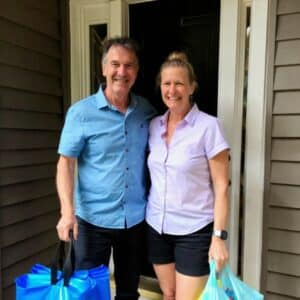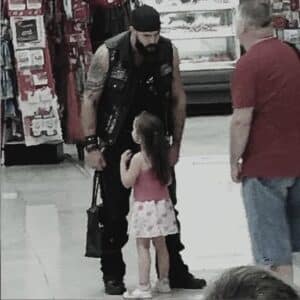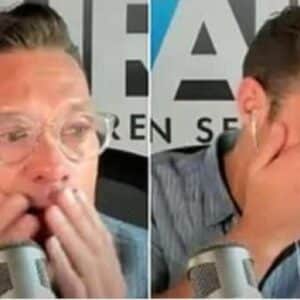I’m still holding my breath when the lawyer says it: “You’ll inherit the estate only if you take guardianship of a girl.”
A girl.
He pushes his glasses up his nose like he’s reading a grocery list. “Her name is Violet. Twelve. Your mother’s been caring for her for two years.”
Two years. The same two years since my father died—since my mother’s voice turned softer on the phone, more distracted. I thought grief made her small and private. I didn’t know it had made her brave.
I drive home with the will in my lap and my pulse in my throat. Steve is in his mother’s kitchen scrolling his phone. Chloe is scouring a plate like it insulted her.
“You have to do it,” Steve says when I tell him. “You can’t keep living here forever. The house, the money—this is our way out.”
It lands like a practical answer to an impossible question. But my mother never did anything without a reason. If she hid a child, she hid a story.
Two weeks later I’m under a flaking sign—HARBOR CHILDREN’S HOME—trying to swallow past the ache. The director’s eyes are kind. “She’s in the activity room,” she says. “She’s… very self-contained. Your mother adored her.”
Violet sits in a corner, knees up, a book balanced there. Dark hair. The wary eyes of something that’s survived too many winters. When she looks up, something hot and terrible rolls through me. I am a stranger who is supposed to be home.
“I’m Kate,” I say, crouching. “Olivia’s daughter.”
She studies me, chin lifted. “You smell like her,” she says. “Flowers.”
My mother’s house was always lavender. I nod even though my cheeks are shaking. “Do you want to get your things? We can go… home.”
She slides on a threadbare backpack. In the side pocket, an envelope with my mother’s handwriting: Sweetheart, I didn’t dare tell you this secret. Violet was my chance at redemption. Now it’s your turn. You’ll find the answers. Love, Mom.
Behind it, a photo: my mother younger, sunlit, beside a man I don’t know, holding the hand of a toddler with a laugh-tilted mouth. An address scribbled on the back.
“Ready?” I ask.
Violet nods the way people do in movies when they’re about to run.
Living with Violet in Chloe’s house is a slow suffocation. Chloe walks past her like she’s air; knives scrape louder when Violet is in the kitchen; cupboard doors shut harder. Steve becomes a ledger: six months guardianship = one house. He scrolls listings for faucets in a kitchen that isn’t ours.
Violet never complains. She knits tiny animals from blankets bleached thin by too many washings and leaves a bear on my pillow like a prayer. She wakes early and cooks eggs with careful concentration.
One night, Steve drops his phone with a clack. “This isn’t working,” he says. “I didn’t sign up to raise someone else’s kid. Not in my mother’s house.” He looks at me like I’m the problem, not the shape of it. “It’s me or her.”
Cowards love corners.
I choose in the space between his words and my heartbeat.
We pack in the morning. Violet holds her little bag to her chest. “Where are we going?”
“To our place,” I say. “It’s not fancy. But it’ll be ours.”
We find a room that’s mostly hallway and a window that sticks. I buy a secondhand lamp with yellow fringe, and when I turn it on, the light makes everything gentler. We eat on the bed the first night and talk about books. When I ask what she misses most, she says, “A garden,” like it’s a person.
Trust grows like a vine—slow, stubborn, impossible to ignore.
I file the petition to adopt. Fingerprints, forms, home visits that make me scrub baseboards at midnight. The hum of the lamp. When the judge smiles—“Congratulations, Ms. Crane”—something clenched finally opens.
My phone rings before we’re off the courthouse steps. “Ms. Crane? The estate transfers in full today,” the lawyer says.
“I thought I had to wait six months.”
“There was a hidden clause,” he says, a smile tucked in his voice. “Your mother wanted to make sure you weren’t doing this for the money. You weren’t.”
I turn to Violet beneath the stone steps. For a moment we’re the only two people in the world. “We’re going home,” I tell her. An hour later, we unlock my mother’s front door and the lavender meets us like a hug.
We build a life inside those creaky floors. I show Violet the room that was mine at twelve.
“Can we paint it green?” she asks. “Like a leaf.”
We say yes to small things: forks askew the way my mother hated, pancakes for dinner, shoes by the door. Violet laughs the kind of laugh that fills hallways and slides under doors. This sound, I think. This is what walls are for.
A note falls from a sweater one evening: You’ll find the answers. I flip the photo. The address waits.
We drive out on a Saturday to a house the color of tired bone, porch surrendered to weeds. Dust and honeysuckle argue in the air.
An older man appears on the neighboring porch. “Can I help you?”
I hold up the picture.
He comes closer, eyes moving from me to Violet to the photo and back. “You’ve got Olivia’s face,” he says softly. “And that’s Victor. I’d know him anywhere.”
In a kitchen crowded with memories he asks about my mother like she might be late, not gone. When I tell him, he nods and steadies his fingers on the table.
“Victor lived there with his wife and little girl,” he says. “His wife died. Your mother… she took care of them. She kept Violet when he was sick, and sometimes when he wasn’t. She and Victor—” He looks at the ceiling. “They loved each other the way two people do when the world says they shouldn’t. Your father wouldn’t have understood. So she loved them in the ways she could. Quietly. Steadily.”
My throat burns. “What happened to him?”
“Cancer,” he says. “He made your mother promise Violet would never be alone.”
He brings a bundle of letters. In them my mother is fierce and kind, making casseroles and covenants, writing about school shoes and hydrangeas and a little girl who says hydrangea like a spell. She never mentions me, but I’m all through the margins—the reason she couldn’t, the reason she had to.
On the drive home Violet asks, “Who was he?”
“Someone who loved your dad,” I say. “Someone who trusted my mom. She kept her promise.”
“Was she scared?” Violet whispers.
“Yes,” I say. “And brave.”
Life expands in increments. We plant a narrow garden along the fence—marigolds, zinnias, a climbing rose. We wake early to water in the cool. Violet talks to the sprouts like they can hear her. Maybe they can.
I leave Chloe’s house with the weight of stepping off a cliff—and none of the drop. Steve calls once to say I’ve ruined everything. I hang up and make pancakes because Violet asks, because I can.
Sundays we walk to the library and stack futures on the checkout counter. I go back to school at night for early childhood education, joining a room full of people who stumbled and stood again. I study at the kitchen table under the yellow lamp. Sticky notes bloom on the fridge: scaffolding, attachment, and, for reasons I can’t explain, bread.
One afternoon Chloe pulls into our drive, small inside her big sedan. She looks everywhere but at me. “I made assumptions,” she says—Chloe’s version of kneeling. “You don’t need my approval. But you have it.”
Violet, dirt under her nails, grins. “Want to see the garden?”
Chloe follows, careful not to step on anything tender. When she leaves, she pats my arm once like a benediction.
A short letter arrives: the deed transfer is done. A note from the lawyer is clipped to it: For what it’s worth, your mother was right about you.
I hang my mother’s photo in the hallway—barefoot at nineteen, paint on her overalls, laughing. Next to it I tack a photo of Violet in the sunroom, paint in her hair, holding a lopsided red flower that looks like joy. Beside those, one of me and my mother: my face sticky with popsicle, her head thrown back.
Evenings, the house creaks in the same old places and smells like lavender and stew. Violet does homework at the table, tongue between her teeth. I water the climbing rose and watch it reach.
Sometimes I think about the clause. About how my mother wanted to make sure I wouldn’t choose a house when I should choose a person. About how love is something you do with your feet and your fork and your backbone. It isn’t tidy. It doesn’t need to be.
One night Violet falls asleep with a book on her chest. I carry her to bed and switch off the lamp. In the hallway I touch my mother’s frame the way my father once did when he thought no one saw.
“Okay,” I whisper—to the quiet house, to the woman in the photograph, to the garden, to the girl breathing softly down the hall. “I found the answers.”
They aren’t what I expected. They’re better.
And quietly, in the space prayer knows, I add the old counsel that has become my way forward: I’ll tie my camel—and trust God. Here, love is kept by promises you make at your own expense and keep anyway. Here, a house is only a house until a girl laughs inside it—and then it becomes home.





